Stargate SG-1 Season 5
Executive producers: Brad Wright, Robert C. Cooper, Michael Greenburg, Richard Dean Anderson
Executive consultant: Jonathan Glassner
Original air dates: June 29, 2001 – May 17, 2002
Mission briefing. SG-1 is trapped in another galaxy, along with Apophis, who has brainwashed Teal’c into thinking that he was a mole for Apophis all along. Unfortunately, the galaxy is also where the Replicators live. They take over and destroy Apophis’s ship and then take over SG-1’s ship and fly it back to the Milky Way where there’s a whole new galaxy of stuff for them to consume. SG-1 and Jacob are able to make the ship crash—taking Apophis and the Replicators with it—and escape back to Earth.
Teal’c, though, still thinks he’s in service of Apophis, and Bra’tac has to engage in a ritual that involves removing his symbiote and forcing him to the edge of death. It succeeds—barely—and Teal’c happily rejoins SG-1 as himself.
This isn’t the last we hear of the Replicators, though—SG-1 discovers their creator, a child named Reese who is far more than she seems, as are the mechanical creatures she created as toys…
Earth-bound threats continue to abound—not just the NID, in the person of Colonel Frank Simmons (Maybourne’s replacement, who puts the SGC through several bits of nastiness), but also an industrialist named Adrian Conrad, who tries to cure his fatal disease with a Goa’uld implantation (with disastrous results). Plus, Martin Lloyd and friends are back, and Martin has taken his experiences with the SGC and made them into a rather pulpy TV show called Wormhole X-Treme! When Teal’c is trapped in the matter stream of a wormhole, it causes issues with both the NID and the Russians.
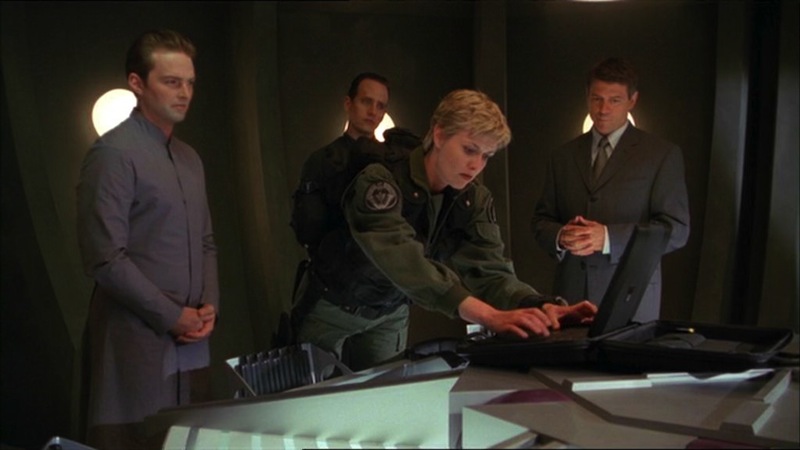
The SGC also encounters various odd alien races: the Aschen, against whom the SGC was warned by the denizens of an alternate future in “2010,” and who turn out to really be that bad; the K’tau, whose sun is damaged by a wormhole and who refuse SG-1’s help to save them; and people who enslave the Unas.
While Apophis is really-o-truly-o dead now, there are plenty of other Goa’uld causing trouble. Nirrti’s experiments on Cassandra when she was younger lead to her almost dying, while the release of an imprisoned Goa’uld named Marduk results in the deaths of several Russian officers. Svarog attempts to take over a planet he’d lost centuries ago due to a piece of technology that was broken by Maybourne’s rogue NID operation, and SG-1 has to fix it. Imhotep tries to break the Jaffa resistance by posing as a Jaffa named Kytano who recruits Jaffa to the cause to set them up to be eliminated. And a Goa’uld (we don’t know who) sends a naquadah asteroid toward Earth, trying to circumvent the Asgard’s protected planets treaty by making it look like a natural disaster.
But the big new Goa’uld in town is Anubis. Believed long dead, he has returned, and is immensely powerful. He has Zipacna, Tanith, and Osiris working for him, he has been making moves on other Goa’uld—the other System Lords call a summit to discuss what to do about him, and wind up capitulating to his superior power—and he’s strong enough to wipe out the Tollan (after attempting to blackmail them into destroying Earth) and seriously hurt the Asgard.
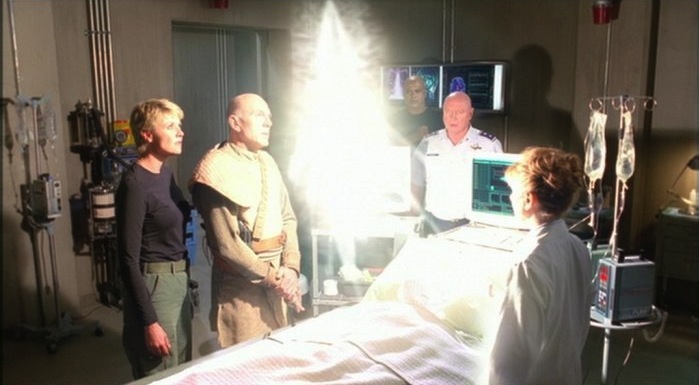
Finally, the Ascended beings whom our heroes encountered on Kheb are becoming more of a presence. One of them takes human form in order to warn Carter not to use a particular weapon—and winds up falling in love with her. And when Jackson takes a lethal dose of radiation while trying to save the lives of the Kelownans (and save them from themselves), he ascends with the help of Oma Desala, though it doesn’t make his “death” any less tragic for the rest of the SGC…
Best episode: “Fail Safe.” Quite possibly my favorite episode of the entire series, this is classic SG-1, with a problem to solve, obstacles to overcome, and real science behind all of it and making it actually that much more dramatic, putting paid to the tiresome complaint that it’s too intelligent for people to follow. The asteroid being heavier than it should be and having naquadah in it is a particular masterstroke that amps up the suspense by using real science, and even the solution—based as it is in the made-up science of hyperdrive—works in context. Plus, it’s got some fantastic lines, from O’Neill’s rant about the poorly made bomb to the physicist unwilling to go through the gate because he knows how it works to the running gag of “I’m confident,” “Me, too,” “As am I.”
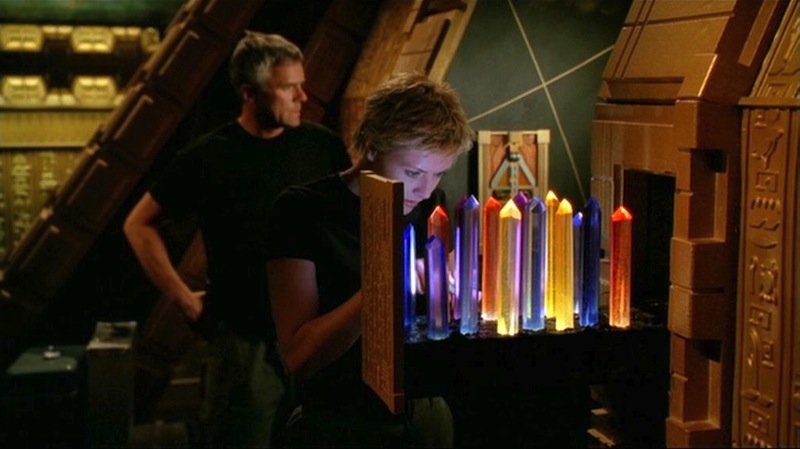
Honorable mention goes to “Wormhole X-Treme!” a hilarious hundredth episode that celebrates by making fun of itself, including pretty much every single fan complaint used on the titular show, with the added bonus of the always wonderful Willie Garson returning as Martin. More in-jokes than you can shake a staff weapon at.
Also excellent: The “Summit”/“Last Stand” two-parter, that introduces a bunch more Goa’uld, establishes the threat of Anubis, tells a thrilling infiltration story with Jackson and Jacob, and tells a nifty action story with the rest of SG-1 and SG-17 on the Tok’ra base. “The Tomb,” a tense horror thriller in a catacomb, with the added tension of O’Neill’s inherent dislike of the Russians. “Between Two Fires,” which goes from conspiracy-based mystery to tragedy as the Tollan’s orderly society is demolished. “48 Hours,” which squeezes in an impressive amount of stuff into a thrill-ride of an episode.
Worst episode: “2001.” The Aschen were spectacularly uninteresting antagonists in “2010,” and they’re not much better here, and the dramatic irony of knowing that they’re evil from “2010” just falls totally flat here.
Dishonorable mention to “Enemies,” in which a particularly nasty cliffhanger is resolved by a series of unrealistic coincidences, with SG-1 surviving and Apophis and the Replicators being destroyed and our heroes going back home due to almost nothing they themselves accomplished.
Can’t we just reverse the polarity? “Fail Safe” in particular does an excellent job with real science, from the asteroid’s being out of the usual plane of the solar system meaning it almost wasn’t discovered to its naquadah composition adding to its density and gravity and proving that it came from another solar system.
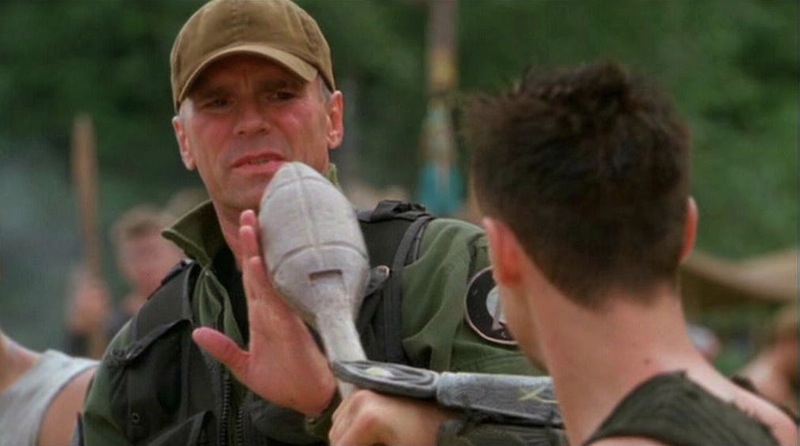
For cryin’ out loud! Some of O’Neill’s finest moments are in this season, mostly of the quipping variety (“Carter, I can see my house!” from “Fail Safe” remains a classic), but I really do like his speech to the rebel Jaffa in “The Warrior” where he explains the difference between a P-90—a weapon of war—versus a staff weapon—a weapon of terror. The Jaffa’s MO really is one of terror, of frightening the already-cowed subjects of the Goa’uld. But the rebellion needs to fight a war, and that requires a different set of tactics, and I like the way O’Neill spells it out in this episode.
It might work, sir. Carter’s reputation for having men who fall in love with her die gets a serious workout in this season, as we have Orlin in “Ascension,” Lantash’s death after confirming that Martouf loved Carter in “Last Stand,” and Narim being lost with the rest of the Tollan when Anubis destroys their world in “Between Two Fires.” Also her reputation for pulling a scientific rabbit out of her hat—having already blown up a sun at the end of last season—gets an equal workout, with everyone looking to her to kick scientific butt in “Red Sky,” “48 Hours,” and “Fail Safe.”
I speak 23 different languages—pick one. The season ends with Jackson’s “death”—he takes a lethal dose of radiation in an act of selflessness, but he chooses to ascend, with Oma Desala’s help—which, if nothing else, left things open for his three guest appearances in season six and his return to the main cast in season seven…
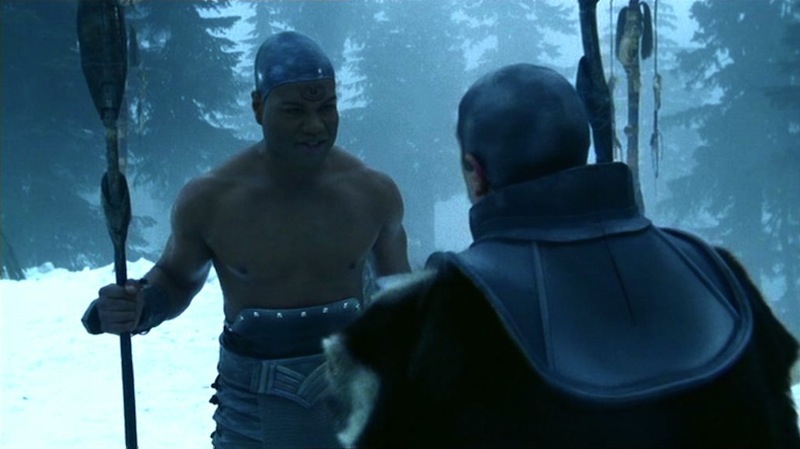
Indeed. In “Threshold,” we get Teal’c’s entire backstory, including Bra’tac recruiting him as his eventual replacement as First Prime, as well as teaching him that the Goa’uld are false gods. It retroactively makes his actions in “Children of the Gods” less out-of-the-blue, as Bra’tac taught him to do his best to make life better for the Goa’uld’s subjects/victims, but it’s Teal’c who feels it should be taken a step further, to full-on rebellion, and he sees the Tau’ri as the means to that. In “The Warrior” it becomes clear just how far-reaching Teal’c’s actions are, as the rebellion has grown by leaps and bounds.
How do I know what color to wear? With the season’s end and Daniel Jackson’s departure in “Meridian,” we also meet his replacement: Jonas Quinn, a brilliant, eager-to-please young man who finds himself exiled from his homeworld for doing the right thing.
You have a go. I keep coming back to “Fail Safe,” but it also has one of Hammond’s finest hours, as both Davis and Fraiser urge him to evacuate to the Alpha Site, but he refuses, declaring, “I haven’t been relieved of this post” with quiet dignity.
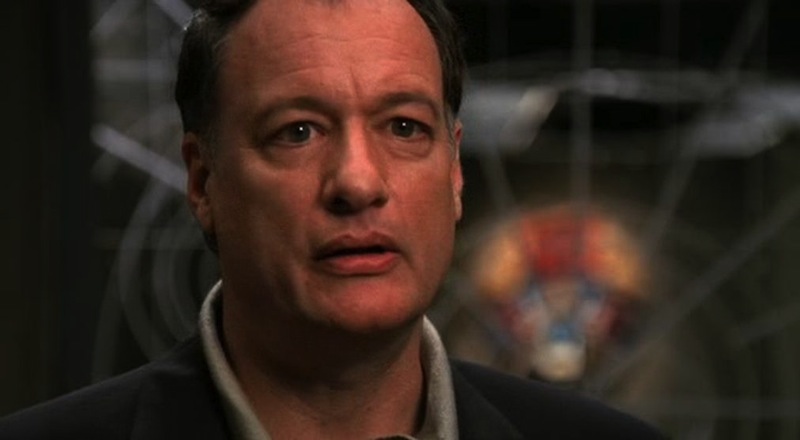
Wayward home for out-of-work genre actors. John deLancie, best known as Q on the various Star Trek spinoffs—and also co-star with Richard Dean Anderson on the tragically short-lived Legend—commences his recurring role as Simmons in four episodes. Former seaQuest DSV stars Peter and Michael DeLuise both appear in “Wormhole X-Treme!” While it’s more in reverse, several people who will later star in Battlestar Galactica show up, most notably Grace Park, the future Boomer, in “Proving Ground” as Satterfield and Rick Worthy, the future Simon (and past guest on several Star Trek episodes), in “The Warrior” as Kytano/Imhotep.
Trivial matters. This is the last season of the show to initially air in the U.S. on Showtime. Its remaining five seasons will air first on the Sci-Fi Channel (later SyFy). Michael Shanks departs as an opening-credits regular after this season, though he’ll return thrice as a guest star in the sixth season and return to the opening credits in season seven.
Besides deLancie’s Simmons, several other recurring characters get their start this season, including Bill Marchant as Adrian Conrad, Peter Flemming as NID Agent Malcolm Barrett (who will actually be an ally to the SGC going forward), Garry Chalk as Colonel Chekov, David Palffy as Anubis (the new big bad Goa’uld replacing Apophis), Cliff Simon as Baal (who will be the longest-lasting Goa’uld antagonist, not being finally stopped until the movie Continuum), Corin Nemec as Jonas Quinn (who will become an opening-credits regular for season six and recur a few times after that), and David Hewlitt as Rodney McKay (who will eventually become an opening-credits regular on the spinoff Atlantis).
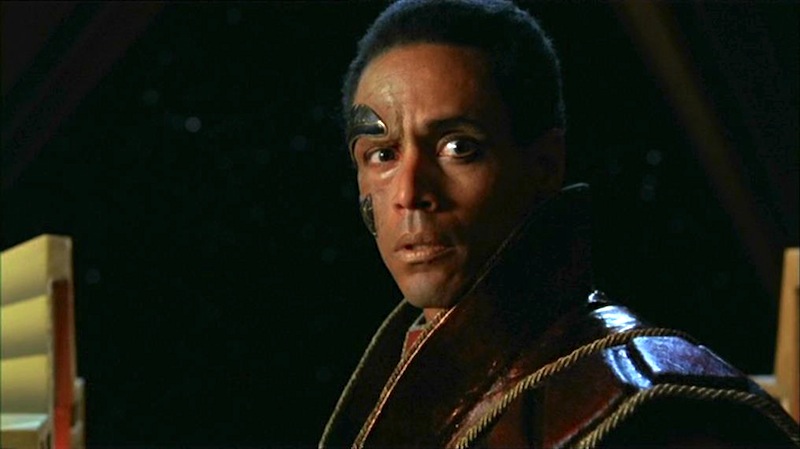
Several recurring regulars are also killed off this season, including Peter Williams as Apophis (though alternate timeline versions of Apophis will appear in future), Garwin Sanford as Narim, Peter Wingfield as Tanith, Jennifer Calvert as Ren’hol, and Marie Stillin as Travell.
Three of the four trainees seen in “Proving Ground” appear at least once more. Hailey previously appeared in “Prodigy,” Eliot returns in “Summit” and “Last Stand,” and Grogan returns in “The Sentinel.”
“The Warrior” is the first of four episodes written or co-written by Christopher Judge, the only one of the acting troupe to take a shot at scripting.
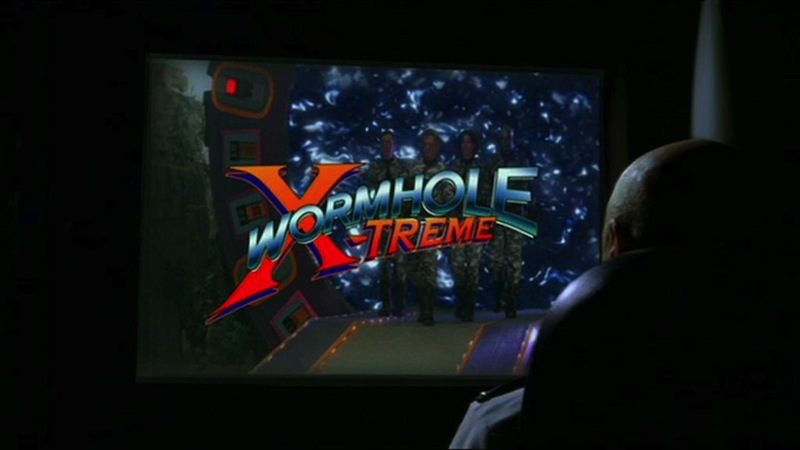
To catalogue all the in-jokes in “Wormhole X-Treme!” would require its own rewatch entry, but suffice it to say, the writers show a spectacular capacity for self-parody and owning up to their mistakes (with several bits from the show being spoofed, including why someone out of phase wouldn’t fall through the floor, the fact that the aliens all speak English, and the notion that three hits from a zat’ni’katel disintegrate the body). Peter DeLuise directs the episode and plays the director of the Wormhole X-Treme! episode being filmed, and also casts his brother Michael as the lead actor in the show, and a large number of the production staff appear in front of the camera in various roles.
Your humble rewatcher is just finishing up Kali’s Wrath, an SG-1 novel that takes place between “The Warrior” and “Menace,” and highlights Kali, whose only onscreen appearances were in “Summit” and “Last Stand” (played by Suleka Mathew, a favorite of mine since DaVinci’s Inquest).
Chevron seven locked. Quite possibly the best overall season of the show, as the two episodes I cited as the worst commit only really the sins of being boring (“2001”) and lazily written (“Enemies”), and nothing else was bad enough to even be considered for such a list of ignominy (though I contemplated “Meridian,” see below).
And the strengths are brilliant. Besides the magnificence of “Fail Safe” (have I mentioned that I really love that one?), the excitement of “Summit” and “Last Stand,” the hilarity of “Wormhole X-Treme!” the suspense of “The Tomb,” and the tragedy of “Between Two Fires,” I want to particularly single out “48 Hours.” This is a classic SG-1 problem-solving story, but it also beautifully picks up on so many different threads. There’s Simmons’s ongoing animus against the SGC (“The Fifth Man,” “Desperate Measures”), the conflicts with the Russians (“Watergate,” “The Tomb”), Adrian Conrad (“Desperate Measures”), and Teal’c’s ongoing animus against Tanith (“Crossroads,” “Exodus,” “Between Two Fires”), plus the introduction of McKay, who will continue to be an entertaining part of the franchise (though he’s rather two-dimensional here, and won’t really gain anything like depth until he joins the cast of Atlantis).
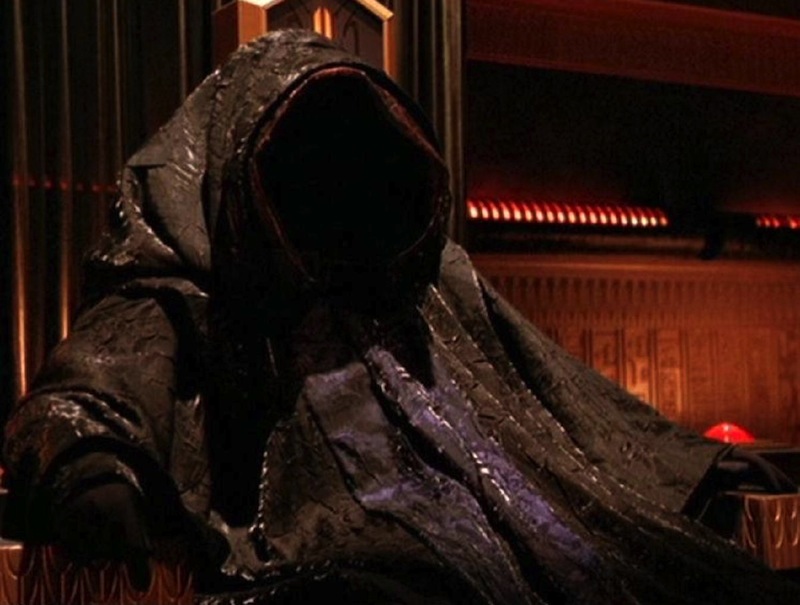
Just in general, there’s tremendous forward movement. Apophis dies, but Anubis has arrived. The Tok’ra are dealt a vicious blow, the Tollan are all but destroyed, the Asgard are weakened—but the Jaffa rebellion is growing by leaps and bounds. The NID remains a threat, but with the ouster of Simmons in “48 Hours” and the introduction of Barrett in “Wormhole X-Treme!” there’s hope for the future.
One of the problems with “Children of the Gods” is that everything kind of barreled toward the eventual status quo with unconvincing speed. The command post at Cheyenne Mountain is made into Stargate Command with unrealistic dispatch, Teal’c is accepted as a member of SG-1 with even less realistic dispatch (and his heel-turn has very little prep beyond Christopher Judge looking nauseated while Apophis tries to find the right host for Amaunet). This season does a very good job of addressing that general lack. The Replicators are given an origin in “Menace,” Teal’c’s journey from loyal Jaffa to the first member of a growing rebellion is beautifully chronicled in the flashbacks in “Threshold,” and future regular Jonas Quinn is nicely set up in “Meridian.”
Speaking of “Meridian,” for many fans it’s the defining moment of the season, as it’s when Daniel Jackson becomes mostly dead (not all dead, as we’ll see). Unfortunately, the episode itself isn’t all that and a bag of chips: it’s pretty much the paint-by-numbers let’s-write-a-character-out story, with the noble sacrifice, everyone getting to say good bye, even setting up his replacement. The hand-wave of ascension was, at least, already set up in the third season’s “Maternal Instinct,” as well as this year’s “Ascension,” but it still feels like a cheat. The only thing that really redeems “Meridian” is Jackson’s own negative self-assessment. The tragedy of the character is not that he’s dying, it’s that his failures loom so large in his own mind that they eclipse any good that might have happened. Sha’re’s kidnapping and eventual death (which he blames himself for, since he encouraged the Abydonians to unbury their gate), Sara Gardner’s being taken by Osiris, the fact that the Goa’uld are at least as big a threat now as they were five years ago—all this he blames himself for, and he refuses to acknowledge the good he’s done, no matter what Oma says.
I do admire that they don’t end the season with “Meridian,” though, instead showing us that there’s plenty more to come: Anubis is a huge enough threat that even the Asgard are helpless against them, and that bodes ill for the future…
Keith R.A. DeCandido’s latest piece of fiction is “Down to the Waterline,” an urban fantasy story starring Cassie Zukav, weirdness magnet, taking place in Key West, Florida, and featuring scuba diving, rock and roll, mysterious undersea murders, ghosts, nixies, and the evils of spam filters. The story is available for free on Buzzy Mag online.










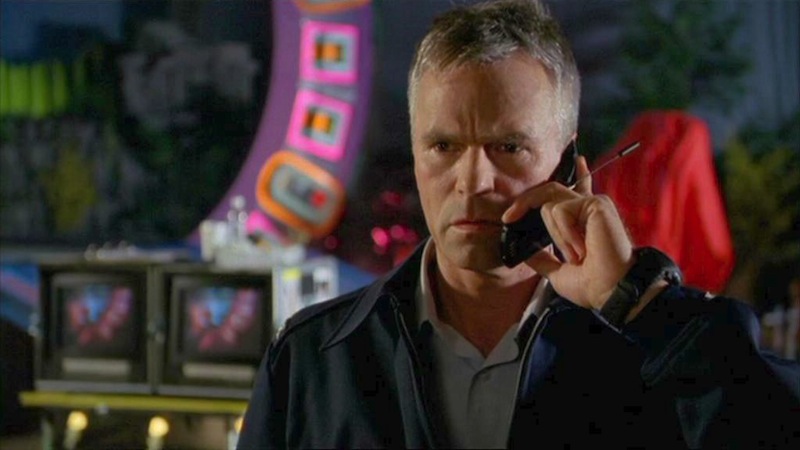
It was Anubis who sent the asteroid in “Fail Safe,” though we wouldn’t learn that until later.
I agree, this was probably the strongest season overall. But when Rodney McKay was introduced, I absolutely hated him. He wasn’t the genius he pretended to be, but an unimaginative blowhard whose entire career was based on knocking down other people’s work (mostly Carter’s) without offering anything constructive in their place. When they decided to make him a regular on Atlantis, I had a hard time accepting him as a legitimate genius. Although I suppose his experiences with Carter may have taught him enough humility to get him to actually question himself and raise his game. Not much humility, of course, but enough.
“Wormhole X-Treme!” is brilliant. All shows should have that kind of self-skewering now and then. There’s “very special” episodes all the time – “Once More With Feeling” on Buffy, etc. – but rarely do you get that kind of silliness. One of my favorites.
Have never been a fan of McKay. What’s the matter with your real first name, man?!
It sure did take me a while to stop seeing Corin Nemec as Parker Lewis, though…
My only quibble with Fail Safe is that there is no way the masquerade ought to have been maintained after that. It doesn’t matter how far from the plane of the solar system it comes from, nor that they manage to squash the original reporting astronomer’s report, once they let something that big get so close that O’Neill can pull off the old “I can see my house from here” gag, and then have those brilliant flashes of hyperspace, just about everyone on the right side of the planet is going to have seen it. Enough amateur and pro-stargazers are going to have seen it, and there is no way to silence them all nor even discredit them all. That’s it, people saw an asteroid vanish and reappear on the other side of the planet. It’s over, secret is out.
Of course the need to maintain the masquerade was always the thing I most disapproved of and also the actions needed to uphold it (although at least the show was decent enough to show that some of the characters were squicked by that too). I wish I knew why the showrunners were always so desperate to keep the secret government conspiracy aspect of the show, especially in later seasons. It was the least needed part.
@3/Random22: I agree totally about the secrecy thing. They shouldn’t have been able to keep the secret after all these big attacks and invasions, and they shouldn’t have needed to. In the later seasons, when most of the major world governments were in on it along with countless civilian scientists and corporations and bad-guy groups on Earth, there was no longer any narrative reason to keep the general public in the dark — and it was a really problematical thing ethically to have a secret military program making decisions about Earth’s role and actions in the galactic community without the general population having a say. There were some later episodes, like “Heroes,” in which the producers questioned and deconstructed the whole secrecy angle, indicating that they recognized the problems with it, but for some reason, they never committed to dropping it. And that was a missed opportunity, since there were so many stories that could’ve been told about how the knowledge of life on other worlds, the Goa’uld, the Ancients, etc. affected human civilization.
Yeah. I mean I can understand how it started being secret spooky black-ops stuff, but by the time people are hurling asteroids around and certainly before (rot13 spoiler) Nahovf syng bhg fvaxf gur Avzvgm pneevre tebhc jvgu n fcnpr ynfre va frnfba frira the secret should have leaked. Or even been deliberately made public. They even seem to be seeding the ground for the latter too.
And I can understand the producer’s reluctance to deal with the whole “the general public are going to be pissed” stuff that would have made great The West Wing scripts, but poor Science Fiction ones (or at least poor ones in a light-hearted action adventure show), but that is what season breaks are for. Come back for the season premiere with a new status quo, and an assurance that all the enraged public stuff happened off screen.
There were several missed opportunities for it too. I guess having started in the X-files era they just wanted to cling to that known ground. Oh well.
@@.-@, According to the writers, the cancelled DTV Revolution was going to finally have the Gate program revealed to the public.
Wish they’d been able to make it, because the SGC’s ability to keep the secret became ludicrous and unbelievable the longer it went on.
@5/Random22: I’m not so interested in the “public outrage at the secret” part. That’s just politics. The strength of science fiction is that it allows us to explore the ways society is changed by new discoveries and technologies and ideas. Good SF isn’t just “Ooh, lookit the aliens” or “Wow, we have teleportation!” It’s “Ooh, here’s how alien ideas change our view of ourselves” or “Here’s how teleporters create new social phenomena and problems.” That’s the bread and butter of real science fiction, and the tendency of TV sci-fi to evade that, to keep the advances secret from the world in order to maintain the pretense of everyday normality, keeps it from operating on the same level as the literature. There have been a few shows that have embraced that potential, like The 4400, but usually TV avoids it. Even Russell T. Davies-era Doctor Who, with its public, present-day alien invasions every fourth week, tried to cheat and have it both ways by having most of the public dismiss the alien invasions as hoaxes. Then Moffat came along and said they’d been erased by cracks in time and nobody remembered them.
@3: The masquerade was to prevent general panic and to avoid demagogic debates on managing the Star Gate program. It is very credible for a politician in a polity knowledgeable of the Star Gate to shut it down for good. The Cold War’s antinuclear campaigns are proof of the risk, the threat of using the nukes was so scary that dismantling the weapons was advocated despite the very real likelihood that such an approach would actually increase the risk that nukes would be used to terrorize a target population.
Imagine an America with just the declassified mission reports from the first season. How about letting Americans know that the Star Gate program almost got the whole planet sucked into a singularity. Once the decision is made that the Star Gate program must proceed to avoid planetary enslavement or annihilation, the rest just follows. Culture wide panic is a scary thing. I salute the producers for understanding that risk and choosing instead to enjoy the tension that becomes naturally available when maintaining the masquerade.
Some of Dr. Who’s best moments were with Pertwee and his Doctor’s friction with Unit. The series has certainly flown closer to the fire recently, but on what occasion does a populace freaking out enhance the chances of competent forces addressing an existential threat? Independence Day spent a little time on that proposition.
Now, if a masquerade is being played because the government is burying its head in the sand, that’s a different kettle of fish. And how much early science fiction is about a super-competent protagonist having to see through a masquerade to save the day contrary to the authorities best efforts? But I have no beef with the SGC-related masquerade. Deep Space Telemetry is a fascinating topic, after all.
@8/dmaktyme: I’ve never bought the whole “The public would panic if they knew of an existential threat” thing. I was born during the Cold War. I spent the first two decades of my life in a world where everybody expected nuclear Armageddon to come along at a moment’s notice. Existential threat was an everyday reality, and we coped with it. I had a college friend who was a child in Vietnam during the war, and though she saw some things I’d consider horrific, they were just everyday life to her. People adjust.
I mean, heck, for most of humanity’s existence, people have lived in times when disease was commonplace and inexplicable, when a whole village or city could be wiped out by a plague at any time — or when a natural disaster or rampaging army could wipe it out. Not to mention all the religious leaders who’ve been preaching for the past 2000 years that the Rapture would be coming any day now. There’s nothing new about existential threats.
So the whole “We can’t tell or people will panic” thing is a common excuse in fiction, but it’s total rubbish. If anything, in most of these shows, keeping the secret does more harm than good. Like any show about aliens or mutants or androids who are being hunted by the government and will be persecuted or dissected if they’re caught. The best way to cope with that would be to go public with their story and get a good lawyer and PR person. There’s no way the government could get away with all that kidnapping and dissection and torture and stuff if the public knew about it.
@9: Well, strictly speaking, if my information is correct, I think the “Rapture” specifically has only been preached for some 200 years or so, with the 2000 figure being more about the Second Coming of Christ generally. (And if we’re more generally saying “religious” and not specifically “Christian”, I guess I have no idea how long people have been preaching the coming of an even more generic “End Times.”)
As for the going public thing, I agree that it seems like it should be harder to keep this secret, especially given how many random people know about it by say, season 8, and I agree that the assertion the world would panic insurmountably is probably wrong. However, I totally accept that the people running it believe that it’s a bad idea, and that such powers would totally drag their feet in letting the secret out, even if keeping it secret is wrong.
@6: If only they had done a better job on “Ark of Truth” and “Continuum,” maybe they could have made that one.
@10: The Ark of Truth and Continuum did very well, in fact. They were on track to make a third SG-1 movie and an Atlantis movie. But MGM’s bankruptcy forced them to cancel the projects.
Probably too late to add in another category to the rewatches, which are good even if too brief for some seasons: “They also serve”, for the other SGC members in each season like Dr. Fraiser (played by Teryl Rothery), Sgt. Siler (played by stunt coordinator and RDA stunt double Dan Shea), and Sgt. Harriman (played by Gary Jones). Sometimes, their bits help hold the rest of the silliness together.
I can buy “people will panic” for works set in the 50s and 60s, we really were paranoid back then and very insecure, so yes. In the 1950s people probably would have panicked when confronted with the threat of alien life. As the 60s rolled on and SF started to creep into the mainstream it became less and less valid, and even by the 1990s I believe people would have more problem with government lying to them and covering it up than they would with alien life (even, or perhaps especially, hostile ones).
I can see, perhaps, the bits of Stargate that fell under the pre-Hayes administration being covered up, because that unknown president really would be toast for having such a huge cover up even though they basically stumbled into it (and the later episodes Heroes 1&2 kinda backs up they knew it). However when they made a big song and dance about a new president, Henry Hayes, they should have gone public. In fact any politician would have seized the chance. Able to pin any mess and discomfort on the previous guy and take ownership of any successes for themselves? That is a political gift.
Anyway, they didn’t, but I refuse to accept any argument from any writer (tv, literature, movie, or whomever) who sincerely advances the argument that in the modern era the reason for a masquerade is that people cannot handle it. Now if they are advancing that as a cover for the much more realistic, “our secret group would have less control and autonomy” then that is another thing. Most conspiracies are based on that much more self-serving reason. Especially now. If aliens invaded tomorrow, there would be less panic and more crowds of people trying to get a selfie with the flying saucer.
Re: keeping SG secret – I still remember, when I watched SG for the first time, it seemed right to me. As if it was important to maintain an illusion that the show takes place in the real world. Back then I divided books and stuff to: set in real world/made up world. Later I found this term I really like: fictional worlds. It’s something from naratology and basically it says that all the worlds in fiction, even if they look real or real-ish, are, well, fictional. They’re all made up, so, anything can happen in any of them. Now I take it for granted, but it was bit of a revelation then. Now I’m thinking: maybe it wasn’t just me, maybe there was some paradigm shift in last decade or so and the sci-fi storytelling switched from “it (whatewer it was) has to stay secret at all cost” to “how would people react if it doesn’t?”…?
Anyway, I really like the “2001” episode. (And the 2010, too.) The Aschen seem to me like much more probable – and scary – bad guys than Goa’uld and the idea of “slow invasion” of aliens who seem friendly at first is so much creepier than the good old “bunch of motherships jumping out of hyperspace.”
@10: while the specific concept of the “Rapture” might be fairly new, the “End Times” are pretty much the core concept of Christianity (being one of the things Jesus supposedly preached about); later writings, e.g. the Revelation, took this up again.
There were also millennial cults and people convinced that the end of the world was nigh as the year 1000 C.E. (or A.D., as you prefer) approached, though they died when the millennium hit and the end of days did not come….
—Keith R.A. DeCandido
Yeah, I goofed by mixing up the concept of the Rapture, which I know is only a belief of certain sects, with the broader concept of the Apocalypse/Revelation (same word in Greek and Latin). I really should know better. It’s the Chuck Austen mistake. He wrote this much-reviled X-Men story arc in which this anti-mutant group had a plan to somehow install Nightcrawler as the Pope, then use some kind of disintegrator communion wafers to make a fake Rapture happen so that mutants would be blamed for bringing the Antichrist, or something — and somehow it eluded his notice that Catholics don’t believe in the Rapture.
Em, getting back to S5 . . . .
I don’t necessarily have any disagreements other than my by now standard this season could have involved a far longer set of re-caps than what we’ve been getting. And, again, from memory, I’d pick Wormhole Extreme as my favorite. There are little things I remember annoying me from other episodes (more fridge logic/plot contrivances such as Sarah/Osiris being the one sent to the System Lord summit when Daniel was sent as Yu’s aide – but also that Yu’s aide was a non-Asian portrayal [though I understand why it had to be part of SG-1]; I can’t remember the specific instance about Fail Safe but there was something along those line about that episode).
I also ended up liking Jonas and didn’t really like after they worked on selling him to us (via selling him to Jack) in S6, they so readily dumped him after Shanks camed back. The Tollen episode also bothered me: OK, Anubis has access to Ancient knowledge so he can circumvent their defense system and blow their new planet up, but the Tollens can’t come up (or didn’t think of back-ups?) and Anubis STILL needs the Tollens tech for the bombs? I understand he needs them to be the ones to send the bomb because of the Protected Planets Treaty but still. I enjoyed it and it had it’s highlights but it’s when some parts started to become annoying more than anything else; it’s when catching it in re-runs becames perfectly acceptable.
@11: It was meant as an acerbic joke. I didn’t know how they did financially–interesting to know that they fared well though. Also interesting about MGM’s bankruptcy–didn’t know that either.
Now I remember what I really wanted to say about season 5 though: I remember finding Orlin pretty creepy before, mostly due to the anti-emotional direction they went for acting, but watching it again I just found him super creepy and was just like “Eew, get away from me!” the entire time. I’m really not sure why Sam tolerates him, even under the premise of gathering intel and stuff. I mean, once he had taken human form and told her he couldn’t disappear anymore, that’s when she should have turned him in. But anyway, he was just really creepy the whole time, giving her all these typical stalker lines, and basically admitting to trying to violate her on the planet.
Regarding the secrecy, I tend to think that even if people (and it would only ever be some people) would panic, it’s still better to get that out of the way when there are cooler heads around to explain things and there isn’t an alien invasion underway. I mean, early days when the threat was only through the stargate, then sure, I can buy keeping the secret for national security. The only thing you’re going to get if you tell the public is a bunch of people blocking the road to Cheyenne.
But later? When there are threats that can come by ship? And can land anywhere on the planet? Keeping their existence secret is hindering protecting people, because they don’t know what they’re up against. later, a few other nations get told, but that wouldn’t help, say, Brazil, if they got a replicator invasion.
Granted people/nations can be stupid and greedy and all those things, so I don’t disagree with the idea that the SGC and higher ups didn’t want to reveal it, under whatever pretext, but as pointed out, it gets a lot less believable anyone could even try to keep the secret, when there are literally hundreds (thousands?) of people who know. And at the point that Earth has legit interstellar spacecraft, why would you want to? “We have the Daedalus, a spaceship that can travel to other stars! woo spaceships! we are awesome! — and also, there might be some aliens out there, but don’t worry, no big. look, spaceships!” bury that information under the super big news of interstellar travel, at least, jeez.
@19, I believe MGM’s bankruptcy was one factor in why SyFy cancelled SGU (aside from the obvious one, i.e. declining ratings).
I think the studio’s financial instability spooked them and considering how expensive the show was, I wouldn’t blame them.
Both SGU and Caprica were seriously damaged by the move to Tuesday nights, which was among the stupidest things SyFy ever did. The Stargate franchise had been a cornerstone of Friday nights since 2002, and the Battlestar Galactica franchise had been the same since 2004, and then they unceremoniously dumped it on a night that had much stiffer competition. Naturally, the ratings went over a cliff….
—Keith R.A. DeCandido
@22/krad: I gather that the reason for the move was because Sci-Fi/Syfy acquired a wrestling franchise, and the previous network had shown it on Fridays, so they assumed they had to keep it on Fridays to appease the wrestling audience (which, sad to say, is much, much huger than the science fiction audience). Which was a mistake, because the wrestling audience is so devoted that they would’ve followed their wrestling show to any night. So there was no sense in hurting the existing Friday shows by bumping them to another night.
@8. Those people never had any real impact on policy. Pershing II and Cruise were deployed in Europe against all their protests. Nor did they put an end to SACs nuclear bombers or the ICBM programs. (Not even the ones that were an obvious waste of money – what were all those bombers for, for example, after Minuteman and Polaris had entered service?)
On the other hand, secrecy makes it harder to find and fix problems in your own programs and procedures, and makes for a worse-informed, and therefore more foolish and panicy, electorate. Secrecy makes people more ignorant than they otherwise would be. That does not make for better decisions.
Plus, in season one secrecy actually put the Stargate program in a position where one guy could shut it down. They even made the point that they’d have more options in dealing with him if everything weren’t secret, but still didn’t think it was a good idea.
Isn’t this season the first of “this is our last season, so let’s wrap things up so our final episode can lead to a movie/spin-off” seasons? I thought that part of the reason for things like wiping out the Tollan was they thought it was the final season until Scifi picked them up.
I always assumed from the showrunner’s perspective that they were afraid making the SGC go public would distract from the focus of the show being a team going out exploring the universe from regular, modern USA, rather than the future. The political stuff made a nice framework to hang the occasional clip show on, but if they went public the show would have to spend time actually showing the public’s reaction and trying to figure out how it would impact global politics, or the show would have to cheat and say it went public and not much changed other than the program having a better budget and some extra lines about burearcracy being a few extra levels deep. I think the showrunners assumed the taking everything public stuff could be some of the last stuff they did, but the longer the show went on the harder it would be to figure out how to handle it and having the Stargate program being a secret was just too ingrained into the show.
From within the show’s universe, I assume at the start the program leaders were assuming they could go public once they had destroyed the threat or at least found the big honkin’ space guns or planetary shield that would keep the earth mostly safe, and by the time ten years had gone by in secrecy the secrecy was such a habit they couldn’t see a good way to get out of it, like any lie that’s gone on longer than expected.
Considering how many random Goua’ld hid out on Earth at different times, it seems like it would have been helpful if they could have put out a PSA letting ordinary citizens to be on the lookout for people with funky deep voices and glowing eyes and to report suspiciously alien acting people – though then they would have the issue of trying to sort through thousands of people insisting their boss or neighbor is an alien.
@26/Eskvar: Right, that’s another thing that often bugs me about these secrecy-based series — the fact that keeping the public ignorant of the threat puts them in greater danger and makes it easier for the villains to do their work. Especially in something like, say, iZombie or a vampire show or the ’88 War of the Worlds: The Series, where the bad guys are going around killing or converting/possessing random people. The secrecy just gets more people killed, because they’re unaware of the threat.